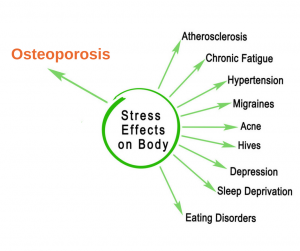 I often talk about the importance of exercise and how the mechanical stress induced by impact exercise stimulates positive bone remodeling. Emerging research indicates that psychological and emotional stress also influences the bone, but NOT in a positive way. To take control over osteoporosis, you need to take control of your stress.
I often talk about the importance of exercise and how the mechanical stress induced by impact exercise stimulates positive bone remodeling. Emerging research indicates that psychological and emotional stress also influences the bone, but NOT in a positive way. To take control over osteoporosis, you need to take control of your stress.
Stress is unavoidable in our modern day society, and everyone experiences stress at one time or another. But prolonged stress can contribute to psychological issues like anxiety. With emerging research suggesting that people suffering from anxiety are at an increased risk for fracture, learning to manage stress and anxiety plays an important role in addressing osteoporosis.
In a recent study published online in the journal Menopause, the journal of The North American Menopause Society (NAMS), researchers found that women who had anxiety faced a noticeably higher fracture risk, compared with women with low levels of anxiety. In addition, anxiety levels were significantly correlated to age, menopause age, years since menopause, and depressive symptoms.
How does anxiety stress your bones?
When your body perceives stress, either physically or psychologically, your body responds by activating your sympathetic nervous system. This system produces hormones and chemicals that help you to “fight or flight.” Although hormones such as adrenaline, norepinephrine and cortisol help to boost your ability to handle the immediate threat, the prolonged secretion of these hormones that occurs with chronic stress can lead to systemic inflammation, suppression of growth hormone and prolonged elevated levels of cortisol. The long term effects of these hormones can both stimulate the osteoclasts (cells that breakdown bone) and inhibit the bone-building osteoblasts. Over time, this leads to bone loss. The third pillar of my BONES Method™ is to Nurture the Soul. In our busy lives, it hard enough to find the time to take care of our bodies, let alone our mind, spirit and soul. Here are some easy things you can do every day to offset the harmful side effects that stress and anxiety have on our bone health.
Ways to Calm your Mind and your Soul
- Laugh– Laughter triggers the release of endorphins, your “feel good” hormones and simultaneously reduces the level of stress hormones.
- Get adequate sleep– Sleep helps to restore and repair the body, mind and spirit, and when we awake more rested we can also better tackle the day’s stress with greater ease.
- Diaphragmatic breathing– Deep breathing is one of the best ways to get oxygen to the brain and help to calm your emotional brain. Make sure you are breathing deep into your belly and not just into the chest area.
- Take a brisk walk– Walking can calm your brain, boosts endorphins and reduce stress hormones.
- Spend time in nature– Spending time outdoors has been shown to relieve stress, improve memory and attention and increase energy levels.
- Meditation– Numerous studies have shown that medication can help you relax, regulate emotions and help bring awareness and insight into your feelings.
If you tried the above methods and are still suffering, anxiety expert Jewell Miriam Gibbs, LPC offers further advise. “Sometimes life gets overwhelming and it feels like it will never get better or the list of things to stress over gets longer and longer. When you find yourself here or expect to be facing stress in the future, I say “Call in all resources!” Find support through groups or reach out to your friends. If your thought is “I don’t want to burden anyone“ or “I’m too embarrassed” say that out loud. Would you really respond to a friend that way? Learning new coping skills, eating well and exercising can help too. If your worry interferes with your life or morphs into panic, consult with a therapist, consider medication if only temporarily in order to pull yourself out of your head so you can rest and calmly work on your stress issues. Remember to pause and remind yourself that just because there is madness all around you, you can walk through this life with clarity, calm and purpose.”
Although our bones seem hard and impenetrable, emotional and psychological stress can and will wear them down, leaving them weak and fragile and susceptible to breaking.
Jewell Miriam Gibbs, LPC has a private practice in Vienna, VA. Her practice focuses on the use of Cognitive Behavioral Therapy, Mindfulness, EMDR and Hypnosis to help people overcome psychological issues.
Contact me today to find out other ways your can build up your bones!






